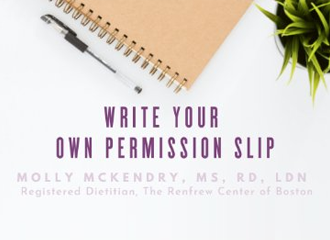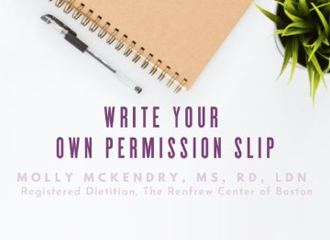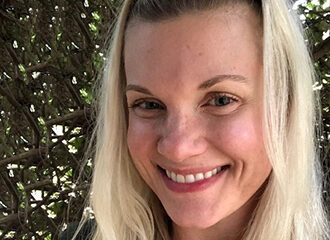By: Molly McKendry, MS, RD, LDN, Registered Dietitian at The Renfrew Center of Boston

At times, it may be tempting to compare your food choices to others, and form judgments about yourself and your experience because what you’re working on is different from what others around you are doing, saying, eating, etc. Not to mention, often times others around us are not aware of just how prevalent diet culture is, and the ways in which it disguises itself (think “wellness”).
Challenging culturally accepted norms takes courage. Breaking through the diet noise isn’t easy, but it’s possible—and with March being National Nutrition Month, it’s the perfect time to start! One step you can take today is filling your social media feed with voices aligned with food and weight neutral approaches to health, and those who are Health at Every Size (HAES) aligned.
When we start to challenge what diet culture says about what and how we “should” eat, we can begin to make space for our own needs and wants. You can practice this by asking yourself what you would give yourself permission to do if you prioritized food freedom and flexibility. Would this look like ordering from that new restaurant you’ve always wanted to try? Allowing a friend to cook dinner for you? Ordering what sounds good off the menu, instead of what feels safest? Giving yourself permission to let go of the “should” and listen and respond to “wants” is an integral part of the eating disorder recovery journey.
Write your own permission slip:
This week, I give myself permission to: _______________________________________
Special thanks to Christine Albertelli, MS, RD, LDN Renfrew Boston for inspiration for this blog post!
Molly McKendry, MS, RD, LDN is a registered dietitian at The Renfrew Center of Massachusetts in Boston, MA. Molly joined The Renfrew Center in August 2019 and completed her undergraduate and graduate education at the University of Vermont. One of Molly’s favorite aspects of her job is empowering others to heal their relationship with food and their bodies, and she believes practicing self-compassion is an important part of this work. In her spare time, Molly enjoys spending time with friends and family and being outdoors.



